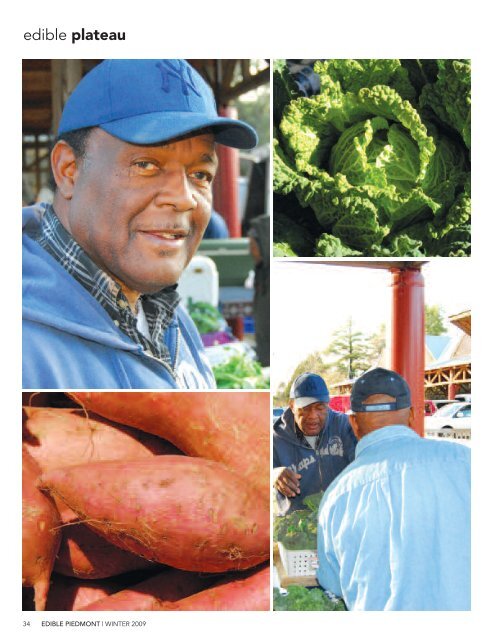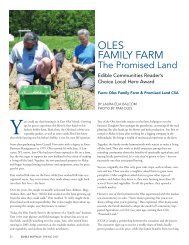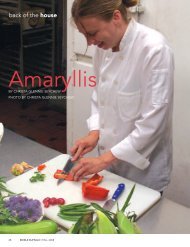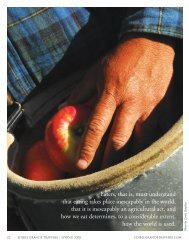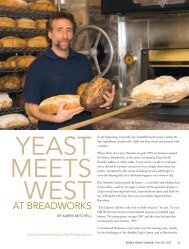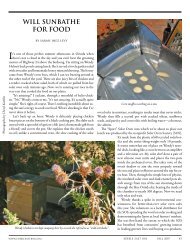edible plateau - Edible Communities
edible plateau - Edible Communities
edible plateau - Edible Communities
Create successful ePaper yourself
Turn your PDF publications into a flip-book with our unique Google optimized e-Paper software.
<strong>edible</strong> <strong>plateau</strong><br />
34 EDIBLE PIEDMONT | WINTER 2009
STANLEY HUGHES<br />
DOING WHAT’S RIGHT<br />
AND GETTING NOTICED<br />
BY NANCIE MCDERMOTT<br />
PHOTOS BY FRED THOMPSON<br />
In the northeastern corner of Orange County, farmer Stanley<br />
Hughes sits at his kitchen table on a rainy winter morning, reflecting<br />
on how much farm life has changed since his grandfather’s<br />
time. Much has changed since 1912, when Hughes’<br />
grandfather, Fletcher Hughes, founded the family farm. But for<br />
Stanley Hughes, much remains the same.<br />
Tobacco is still the bill-paying crop on the 75 acres Hughes has<br />
worked since the late 1970s. Nowadays he grows organic tobacco for<br />
the Santa Fe Natural Tobacco Company, along with a cornucopia of<br />
organic produce that he supplies to grateful chefs and sells at farmers<br />
markets around the Triangle.<br />
Hughes’ farm and produce have earned him high praise and much<br />
success since he began working organically in the mid-1990s. In addition<br />
to farmers markets, Hughes has supplied his produce and meats<br />
to top area restaurants, including Elaine’s on Franklin, Lantern, Magnolia<br />
Grill, and Watt’s Grocery. Since 2000, Hughes and Pine Knot<br />
Farm have been singled out on the state and national food and agriculture<br />
scenes, beginning with a shout-out for his exemplary collard<br />
greens from Gourmet magazine in its 2003 produce issue. The following<br />
year, the North Carolina Co-Op Extension Service named him<br />
the Small Farmer of the Year for 2004. In October, Bon Appétit magazine<br />
singled him out as one of the Carrboro Farmers’ Market’s extraordinary<br />
vendors of certified organic produce, pasture-raised<br />
chicken and pork, and homemade sausage. Slow Food Triangle counts<br />
on him to provide his delicious sweet potatoes, greens, butter beans,<br />
broccoli and meats for such events such as the “Farm to Fork” dinner<br />
honoring Slow Food founder Carlo Petrini in May of 2007. Hughes<br />
was among the local delegation of farmers and food producers that<br />
traveled to Turin, Italy, in 2006 for Slow Food’s international conference<br />
Terra Madre.<br />
Hughes’ dedication to organic farming is both old and new; while his<br />
farm wasn’t officially certified organic until a decade or so ago, it has<br />
always been a natural, sustainable enterprise. “We didn’t have the<br />
money to go out and buy a lot of pesticides,” he says with a smile. The<br />
youngest of his father Bennie Hughes’s 12 children, Stanley Hughes<br />
helped the family tackle the problem of weeds the old-fashioned way,<br />
working the rows with his hands and a hoe. The old ways have always<br />
made sense to him, not simply because of cost but as the key to<br />
growing healthful, delicious food. As a third-generation farmer, he<br />
continues to farm in the sustainable, environmentally friendly ways his<br />
father and grandfather taught him, with the benefit of modern<br />
equipment, knowledge, and agricultural practices that make organic<br />
farming a viable business.<br />
Hughes takes an active part in Operation Spring Plant, an Oxfordbased<br />
non-profit dedicated to promoting farming as a business and<br />
way of life among minority and poor communities around the<br />
country. Deeply proud of his hard-won success in helping keep his<br />
own family farm alive and well for three generations, Hughes has<br />
EDIBLE PIEDMONT | WINTER 2009 35
traveled throughout North Carolina and around the country, teaching<br />
and encouraging others to start up, expand, and succeed in farming.<br />
Two years ago, Hughes married Linda Leach-Hughes, a Lumberton<br />
native who had recently retired from her first career as a Senior Vice<br />
President at Robeson Community College. Not one to sit in the porch<br />
swing, Leach-Hughes has taken up the challenges of marketing Pine<br />
Knot Farm with energy and creativity, working to ensure a second<br />
hundred years of success for the family enterprise. In addition to organizing<br />
and managing the farm’s paperwork and communications,<br />
she has concentrated on expanding their presence at farmers market in<br />
Durham, Raleigh North Hills, and at two UNC locations, one in the<br />
Children’s Hospital atrium and the other at the Hedrick Building.<br />
“Our farmers market set-up is totally different,” Stanley Hughes says<br />
with a big smile. “I’m the salvage yard—she’s the dealership!” With an<br />
eye for color and display, Leach-Hughes sets out bright blue tubs of vibrantly<br />
colored vegetables, lining them up on checkered tablecloths<br />
and providing business cards and recipes. She’s ordered shirts and calendars<br />
with a Pine Knot Farm logo, patronizing vendors in Hillsborough,<br />
Burlington and Mebane to keep things local.<br />
“Marketing is just recruiting customers, drawing them to our table. I<br />
can talk non-stop, and Stanley sits back and lets me go to it!” Her conversation<br />
pays off well—recently a bakery-owner in Marysville, Ohio,<br />
called up after researching sweet potatoes on the Internet. An Alabama<br />
native, she was fed up with the poor excuses for sweet potatoes in her<br />
marketplace. After a half-hour conversation with Leach-Hughes, she<br />
ordered a 40-pound box of Pine Knot Farm sweet potatoes shipped to<br />
her in Ohio, and plans to keep herself stocked up from now on.<br />
A few years ago, Stanley Hughes’ sister, Peanella Hughes, moved back<br />
to the homeplace, a beautiful white farmhouse their grandfather built,<br />
after retiring from her career as an educator. Thanks to the knowledge<br />
she gained growing up on the farm, the family farmhouse kitchen is<br />
once again a source of home-baked pies, preserves, and more. Using<br />
the fruit from trees and vines planted by their grandfather and father,<br />
or growing wild on the property, she cooks old-time dishes for the<br />
new millennium, picking scuppernong grapes from the arbor, gathering<br />
black walnuts and hickory nuts, pears, apples and peaches, and<br />
strawberries. She also makes mighty fine sweet potato pies, using sweet<br />
potatoes from her little brother Stanley, who’s still farming the Hughes<br />
family land, right across the road.<br />
36 EDIBLE PIEDMONT | WINTER 2009
SWEET POTATO PIE<br />
Sitting at his kitchen table, Hughes seems like a man in tune with the<br />
earth and the world. He’s deeply proud and grateful to be doing the<br />
work he does, and he hopes that we can educate people to the worthiness<br />
of good, natural food. He’s certainly doing his part to bring it<br />
from the earth to the marketplace; getting it to our tables from farms<br />
like his is a privilege indeed.<br />
eP<br />
Born in Burlington, raised in High Point, Nancie McDermott spent<br />
three years as a Peace Corps volunteer in Thailand. Her nine cookbooks<br />
include Real Thai: The Best of Thailand’s Regional Cooking,<br />
and Quick and Easy Chinese, out this fall from Chronicle Books. She<br />
lives with her family in Chapel Hill, NC.<br />
If you can make it to the farmers market in Carrboro or Durham on a<br />
wintry Saturday morning, treat yourself to a big sack of Stanley<br />
Hughes’ sweet potatoes and make this classic pie. Many of his piemaking<br />
customers like to use his Beauregard variety along with a few<br />
O’Henrys. To prepare sweet potatoes for the pie, trim ends and cut<br />
into 2-inch lengths. Place in a large saucepan with cold water to cover<br />
them, and bring to a rolling boil. Reduce the heat to a gentle boil and<br />
cook about 30 minutes, until they are just tender, but still firm. Drain,<br />
let stand in cold water until cool enough to touch, peel, and then<br />
mash to a smooth puree. Makes one 9-inch pie.<br />
1 cup sugar<br />
1<br />
⁄2 teaspoon cinnamon<br />
1<br />
⁄4 teaspoon nutmeg<br />
1 cup evaporated milk or half-and-half<br />
2 eggs, beaten well<br />
3 tablespoons melted butter<br />
1 teaspoon vanilla extract<br />
1 1 ⁄2 cups mashed cooked sweet potatoes<br />
1 unbaked 9-inch pie crust<br />
Preheat the oven to 375 degrees. In a small bowl combine the sugar,<br />
cinnamon and nutmeg, and use a whisk or a fork to mix them together<br />
well.<br />
In a medium bowl, combine the evaporated milk and the beaten<br />
eggs, and stir with a fork or whisk to mix well. Stir in the butter and<br />
vanilla, and mix to combine everything evenly and well.<br />
Add the mashed sweet potatoes and the sugar and spice mix to the<br />
egg-milk mixture and stir well to bring everything together into a<br />
thick, fairly smooth filling.<br />
Transfer the filling to the pie crust and bake for 40 to 50 minutes, or<br />
until the filling is firm at the center and puffed up around the edges.<br />
(Insert a toothpick or tip of a paring knife near the center; if it comes<br />
out clean, the filling is done.) Remove the pie from the oven and set it<br />
on a cooling rack or a folded kitchen towel to cool. Serve at room<br />
temperature.<br />
EDIBLE PIEDMONT | WINTER 2009 37


